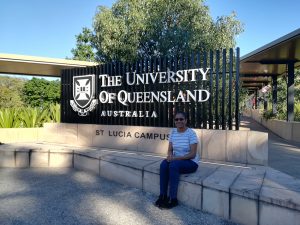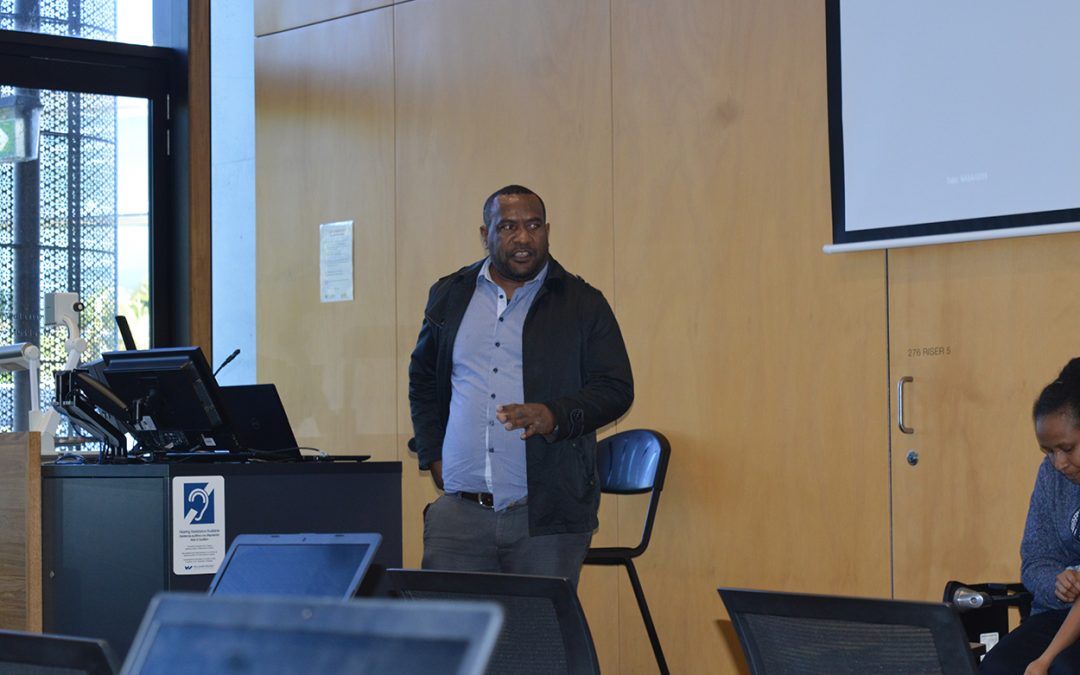Theory and practice came together during an innovative Australia Awards course focused on climate change challenges and advocacy in Papua New Guinea earlier this year.
The Graduate Certificate in Environmental Management (Climate Change Policy) Short Course at the University of Queensland saw 26 Papua New Guinean participants develop their skills and knowledge ahead of practical application back home.
Among the participants were Thomas Ninkama and Emily Pomoh, both working for government organisations and eager to apply what they learned during the course.
Thomas, who is a Senior Research and Risk Assessment Officer with the Papua New Guinea National Disaster Centre in Port Moresby has worked in disaster risk management for the past 15 years.
He describes climate change in Papua New Guinea as ‘a challenge to development initiatives in the country.’
‘I have seen that extreme weather events are a new threat to the lives of our people and infrastructure development in the country. This motivated me to take up this study in Graduate Certificate in Environmental Management (Climate Change Policy) to understand the science behind climate change, the principles of environmental management and know the relevant policy framework that can be used to address the issue to help the communities and development in this country,’ Thomas says.
Fellow participant Emily Pomoh adds, ‘we all have either seen, read, heard or even have had personal experiences of the impacts of climate change, for instance, sea-level rise, highlands region of Papua New Guinea getting warmer making it suitable for mosquitoes to exist, food security issues. The list is very long.’
Emily works for the Mitigation Branch of the Climate Change and Development Authority (CCDA). Her role examines renewable energy, policy and how energy efficiency policies can effectively reduce greenhouse gas emissions.
‘We have to break the impacts down into understandable sections so that we can better plan [strategic policy development] and hence allocate resources appropriately with the hope that we mitigate the impacts,’ Emily says.
Practical skills and advocacy a priority
The Graduate Certificate in Environmental Management (Climate Change Policy) Short Course aims to enhance participants’ skills and understanding in recognising climate change issues affecting Papua New Guinea, analysing international policies and laws on climate change and advocating on proven global strategies in the PNG context.
While in Australia, the group participated in field trips by visiting North Stradbroke Island where they learnt about Indegenous involvement in economic development and environmental management.
Thomas found the field trips very beneficial as participants learned about practical assessments and report writing on climate change.

Photo of Emily Pomoh at the University of Queensland while studying the Graduate Certificate in Environmental Management short course award
The pair also took part in the Al Gore Climate Reality Leadership Corps training, which involved discussions with fellow participants from across Australia and the Pacific about climate change challenges and responses.
‘Everything I learnt was very beneficial and relevant to the work I do in Papua New Guinea’, Thomas says.
Emily feels the same and says even though Papua New Guinea has relatively low greenhouse gas emissions on a global scale, the country is nonetheless affected by what is an international concern.
Contributing to addressing climate change in Papua New Guinea
Graduate Certificate participants are also required to undertake a work project relevant to the course. For his project, Thomas plans to partner with relevant stakeholders to establish weather stations in drought-affected areas of PNG to improve early warnings of drought and food security.
He also plans to work closely with the Office of Climate Change and Development to include climate change responses in development policies.
‘The best we can do is to learn how to adapt to such events and survive during trying times. Therefore, I believe our efforts in addressing this issue at a smaller scale will contribute in a big way,’ Thomas said.
This focus is similarly shared by Emily.
‘Knowledge gained through the course is already helping me to establish dialogues with the Department of Works and Implementation who are the custodians of the Building Regulations to possibly look at refining the building standards for energy efficiency she says.
Australia Awards Short Course Awards offer targeted programs tailored to develop knowledge and skills, address priority human resource development needs through the PNGAus Partnership.
